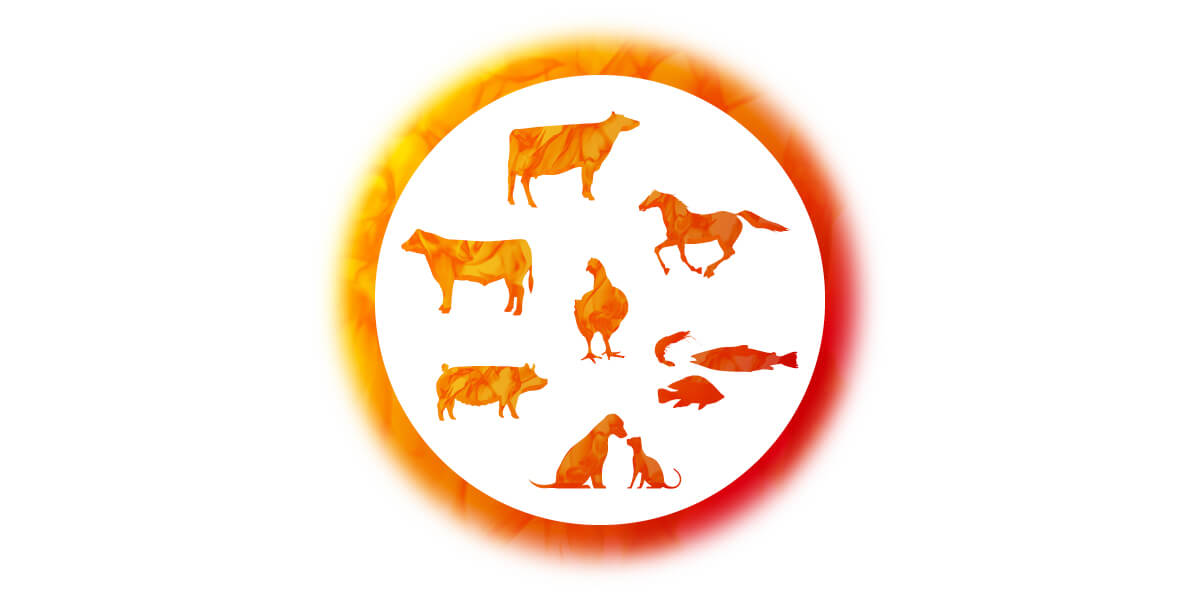Epithelial tissue, including skin, is an animal’s first line of defense against environmental challenges. It covers all exterior and interior surfaces of the body, like its cavities, tubes, organs and blood vessels, including the respiratory, reproductive, urogenital and gastrointestinal tracts.
Epithelial cells are “bound” or “stitched” together by complex protein structures generally called tight junctions. The role of these tight junctions is to hold cells together. When tight junctions are weakened or fail, bacteria, pathogens and their toxins are able to pass through epithelial tissue and into the blood stream, leading to activation of the immune system and inflammation. Epithelial tissues must be constantly repaired and replaced, and the integrity of tight junctions maintained in order to protect against environmental challenges.
Strengthen Tight Junctions, Improve Epithelial Integrity
Trace minerals, like zinc and manganese, are critical to production and maintenance of epithelial tissues.
To maintain a protective layer and cellular structure, epithelial cells contain a cytoskeleton matrix composed of keratin filaments or tightly-wrapped protein fibers. Keratin’s primary role is to make skin a pliable, insoluble and unreactive barrier against the natural environment. Zinc is a key mineral in the process of keratinization.
Manage Leaky Gut and Intestinal Inflammation
The lining of the gastrointestinal tract is comprised of a layer of epithelial cells bound together by tight junctions. Their role is to prevent bacteria, pathogens and toxins from passing through the intestinal lining and into the blood stream. When tight junctions become weakened, bacteria, pathogens and toxins are able to pass between epithelial cells, resulting in a condition called leaky gut. This can be caused by heat stress, bacteria, feed contaminants, dehydration and/or a zinc deficiency.
Leaky gut may result in cell damage or intestinal inflammation as a result of the immune system’s reaction. When inflammation occurs, the body’s immune system will require more nutrients to energize the immune system to combat the challenge, leaving less nutrients available for performance, such as muscle growth in growing animals. Supplementing animal diets with zinc from Availa® Zn can help manage inflammation by strengthening bonds between epithelial cells in the GI tract and maintaining tight junctions.
Research in sows shows that offspring demonstrated signs of greater intestinal protection, including greater intra-epithelial lymphocyte and goblet cell numbers when sows were fed Availa® Zn as a part of their nutritional plan during gestation. Research also showed that heat-stressed sows fed Availa-Zn demonstrated a combination of fewer gut integrity issues and a more robust response to immune challenges, resulting in an increase in animal performance.
In addition, a summary of 23 research trials showed intestinal strength was enhanced by more than 15 percent in poultry supplemented with zinc, manganese or a combination of both from Zinpro Performance Minerals® versus poultry supplemented with inorganic (sulfate) forms of the same minerals.
Decrease Skin Scratches in Broilers
Exterior epithelial tissue protects broilers from disease by acting as a physical barrier between the bird and its environment. When the skin of a bird is scratched, it is more susceptible to a bacterial infection that can impact the overall wellness of the bird and result in a carcass condemnation.
Epithelial tissue is dependent on zinc to protect against bacteria and physical damage. Research at Auburn University revealed that the proportion of skin lesions in poultry decreased from 42.7 percent to 9.6 percent in broilers fed Availa-Zn instead of inorganic zinc sulfate. The proportion of broilers with cellulitis declined from 52 percent to 40 percent and the incidence of severe cellulitis declined from 20 to 8 percent in broilers fed zinc from Availa-Zn.
Research has shown that feeding zinc from Availa-Zn can improve broiler skin integrity by helping to reduce the incidence of sores, scabs, scratches and pododermatitis in chickens. This results in less potential for carcass condemnation and more meat to sell.
Improve Foot Health in Dairy and Beef Cattle
Several studies have shown that Zinpro Performance Minerals can improve claw integrity. A year-long study at Illinois State University revealed cows fed an additional 200 milligrams per day of zinc from ZINPRO® had fewer cases of foot rot, heel cracks, digital dermatitis and laminitis than cows not fed ZINPRO®.
In a larger, longer-term study with more than 2,900 dairy cows, those supplemented with zinc, manganese, copper and cobalt as Zinpro Performance Minerals saw a decrease in claw lesions. Lesions most susceptible to epithelial tissue damage were the most receptive to improved trace mineral availability. Double soles decreased by 59.2 percent, white line by 34.2 percent and digital dermatitis by 33.1 percent.
In beef cattle receiving 216 milligrams per day of ZINPRO® zinc methionine, only 2.45 percent of cattle suffered from foot rot compared to 5.38 percent of cattle with foot rot which did not receive ZINPRO® zinc methionine.
Maintain Epithelial Tissue Integrity
Epithelial tissue is the first line of defense against harsh environmental challenges and must constantly be repaired and replaced. Trace minerals are critical in production and maintenance of epithelial tissues. Supplementation with zinc, manganese and copper from Zinpro Performance Minerals helps improve epithelial tissue, resulting in improved animal wellness and performance.

